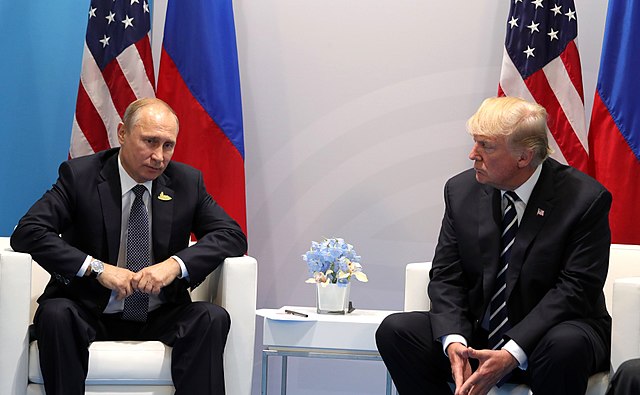Russia, North Korea, Iran: The Comprehensive Sanctions Bill Currently on Trump's Desk
After a long and winding road, both houses of Congress have finally passed a bill which—if signed into law—would essentially require President Trump to impose significant new sanctions, including against Russian interests. On July 28, Congress passed the Countering America’s Adversaries Through Sanctions Act, and the bill was presented to President Trump.

Published by The Lawfare Institute
in Cooperation With

After a long and winding road, both houses of Congress have finally passed a bill which—if signed into law—would essentially require President Trump to impose significant new sanctions, including against Russian interests. On July 28, Congress passed the Countering America’s Adversaries Through Sanctions Act, and the bill was presented to President Trump.
The bill’s path to the president’s desk certainly has not been smooth. Earlier versions of the bill were covered here and here, and some of the drama was covered here. Now all eyes will shift to President Trump who reportedly plans to sign the bill “very soon,” despite reports that the White House pushed back against the congressional review provisions, arguing they “infringed on Trump’s executive authority.” (Update: President Trump signed the bill on the morning of August 2, shortly after this post was published.)
This post will provide a brief overview of the final bill as passed, including the new measures against Iran and North Korea. Because the vast majority of the Russia-related provisions passed unchanged, this post will provide a brief overview of the most controversial part—the congressional review provision—and outline several criticisms that have been made in recent weeks. It will then turn to the North Korea- and Iran-related provisions.
Just as with previous versions of the bill, the final legislation contains more material that can be covered in a single post. This post endeavors to provide an overview of some of the more unique parts of the bill, but there are numerous provisions—such as those targeting human rights abuses—that will be saved for a later update.
Russia
The centerpiece of the legislation—and the portion that has rightly generated the most media attention—is the congressional review provision, which has been dubbed the Russia Sanctions Review Act of 2017. This provision essentially prohibits President Trump from lifting any existing sanctions against Russia without first explaining to Congress in a report what he has gotten, or will get, from the Russians by way of concession. The legislation requires the administration to send the report to the appropriate congressional committee, at which point the clock begins to tick. Congress then has thirty days to hold any hearings and consider a resolution of approval or disapproval under expedited procedures. (The exact procedures were one source of debate throughout this process and are discussed in more detail here.)
The provision is drafted quite broadly to cover actions that have any ameliorative effect despite falling short of formally lifting sanctions. For example, congressional review is required for a waiver, “a licensing action that significantly alters United States’ foreign policy with regard to the Russian Federation,” and any action which would allow Russia to regain access to properties in Maryland and New York.
A number of stakeholders have levelled a variety of constitutional arguments against the review provision, First, there are those—including the White House—who argue that it impinges on the President’s inherent Article II powers. As the Washington Post reported in June:
The Trump administration has publicly warned against impeding presidential prerogatives to relieve sanctions. “We would ask for the flexibility to turn the heat up when we need to, but also to ensure that we have the ability to maintain a constructive dialogue,” Secretary of State Rex Tillerson told the House Foreign Affairs Committee last week. [A] White House official, who spoke on the condition of anonymity to talk more freely, said the administration’s concern is one of separation of powers and not policy toward Russia.
This argument appears to have fallen on deaf ears. For example, Sen. Corker (R-TN), Chairman of the Senate Foreign Relations Committee—who faced similar arguments in the Iran context (considered by Jack here)—seems to reject the premise that the president has preclusive Article II authority over sanctions. In a press release his office issued after the original Russia sanctions bill passed, Corker argued forcefully that he thought the pendulum of foreign policymaking power had swung too far towards the executive branch, and he intended to correct that:
“For decades, Congress has slowly and irresponsibly ceded its authorities to the executive branch, particularly as it relates to foreign policy,” said Corker. “Today marks a significant shift of power back to the American people’s representatives, something that has been a top priority of mine since becoming the lead Republican on the Senate Foreign Relations Committee more than four years ago. . . . With passage of this legislation, the Senate reasserts congressional authority – while providing the Trump administration appropriate national security flexibility – and sends a clear signal to both Iran and Russia that our country will stand firm in the face of destabilizing behavior and that Congress will play a leading role in protecting our national interests,” added Corker.
Rep. Ed Royce (R-CA), Chairman of the House Foreign Affairs Committee, also addressed the Article II criticism in his floor statement ahead of a vote on the final bill:
To ensure these economic sanctions remain in place as long as Russian aggression continues, this bill empowers Congress to review and disapprove any sanctions relief. This strong oversight is necessary and appropriate. After all, it is Congress that the Constitution empowers to regulate commerce with foreign nations.
In fact, according to recent coverage, “the final dispute among congressional leaders had to do with senators wanting to apply a similar congressional review provision to the North Korea sanctions portion of the bill.” All of this is to say that the Article II argument does not seem to have done much work for the White House.
Second, there are those who argue that the bill violates Article I’s Presentment Clause by enacting the kind of legislative veto that the Supreme Court held was unconstitutional in Immigration and Naturalization Service v. Chadha, 462 U.S. 919 (1983). Professor Daniel Hemel explains:
The Constitution’s presentment clause says that before a bill or resolution that passes the House and Senate can become law, it must be presented to the president . . . . And as the Supreme Court held the 1983 case Immigration and Naturalization Service v. Chadha, this presentment requirement generally applies to any congressional action that “alter[s] the legal rights, duties, and relations of persons . . . outside the Legislative Branch.”
Section 216 plainly violates the presentment clause. To see how, imagine that on September 1, President Trump proposes lifting sanctions against Russia and sends the requisite report to Congress. If Congress does not act, sanctions will be lifted on October 2. . . . Now imagine that on October 1, Congress passes a joint resolution disapproving of the president’s proposal. Let’s say that the resolution passes 218-217 in the House and 51-49 in the Senate. Under section 216, that means the sanctions remain in place through October 13, plus 10 more days after a presidential veto.
So the passage of the joint resolution by a simple majority vote on October 1 would alter the legal rights, duties, and relations of persons outside the legislative branch from October 2 through October 13. If not for the joint resolution, sanctions would be lifted, allowing Americans to engage in various transactions with Russia. The joint resolution changes that . . . . But recall that under the presentment clause, Congress cannot change the law without presenting a bill to the president and either having him sign it or overriding his veto. And yet that is exactly what section 216 purports to allow Congress to do. It allows Congress to alter the legal landscape for 12 days (plus possibly 10 more) with a simple majority vote and without the president’s signature.
This is a fascinating argument that will hopefully be discussed in greater detail in a later post. For the moment, however, it is worth mentioning that this would not be the first time legislative vetoes of one sort or another have been enacted post-Chadha.
North Korea
The legislation also includes a number of provisions relating to North Korea. Title III of the bill, entitled the Korean Interdiction and Modernization of Sanctions Act, adds new sanctions, alters existing ones, and imposes a variety of reporting obligations. For example, this part of the bill amends the Section 104(a) of the North Korea Sanctions and Policy Enhancement Act of 2016 (codified at 22 U.S.C. § 9214(a)) to require the president to sanction persons who—“knowingly, directly or indirectly”—purchase from North Korea large quantities of certain metals (including gold); sell or transfer large quantities of rocket/jet fuel for non-commercial air travel; insures or registers government vessels; or “maintains a correspondent account (as defined in section 201A(d)(1)) . . . with any [non-UN approved] North Korean financial institution.”
That last category is a big one, and the exceptions which are fleshed out later in the bill pretty much only cover transactions licensed by Treasury. So, effectively, the bill instructs the president to sanction foreign financial institutions that maintain correspondent accounts with non-excepted North Korean financial institutions. Those are some serious secondary sanctions. For those who may not be aware, correspondent banking covers the bank-to-bank financial relationships that allow banks to move large amounts of money internationally. A more detailed explanation can be read here, but a useful metaphor is to understand correspondent banking as a critical part of the international financial plumbing. This goes further than a 2016 Section 311 action targeting North Korea. The final rule associated with that action is more akin to a transaction ban with attendant due diligence requirements:
Section 1010.659(b)(1) and (2) of this rule prohibits covered financial institutions from opening or maintaining in the United States a correspondent account for, or on behalf of, a North Korean banking institution. It also requires covered financial institutions to take reasonable steps to not process a transaction for the correspondent account of a foreign bank in the United States if such a transaction involves a North Korean financial institution.
In contrast, the newly-passed bill actually sanctions those institutions that maintain correspondent relationships with North Korean banks, including by blocking their assets. Incidentally, the new bill also seems to codify the 2016 Section 311 action. And it expands forfeiture authorities, allowing the seizure and forfeiture of any “vessel, aircraft, or conveyance used to facilitate any of the activities described in section 104(a) under the jurisdiction of the United States.”
Separately, the bill adds numerous new discretionary designation criteria that permit—but do not require—the president to sanction individuals for a variety of types of conduct, including even broader financial activities, beyond correspondent banking. It also includes a number of shipping-inspection provisions and creates a number of new reporting or briefing requirements. For example, the bill requires a briefing within 180 days to discuss which persons or governments are providing “specialized financial messaging services” to North Korean financial institutions or persons acting on their behalf. It further requires “a detailed assessment of the status of efforts by the Secretary of the Treasury to work with the relevant authorities in the home jurisdictions of such specialized financial messaging providers to end such provision or access.”
When read together, these provisions demonstrate a sophisticated approach to coercive financial measures and suggest that Congress is increasingly willing to impose secondary sanctions targeting the North Korean regime’s activities.
Iran
Finally, the legislation also includes a number of provisions relating to Iran. Title I of the bill, entitled the Countering Iran’s Destabilizing Activities Act of 2017, imposes new designations and adds several reporting requirements. For example, the bill requires the administration to submit—and update every two years—a “strategy for deterring conventional and asymmetric Iranian activities and threats that directly threaten the United States and key allies in the Middle East, North Africa, and beyond.”
The bill also requires the president to sanction individuals facilitating Iran’s ballistic missile capabilities, including anyone who:
knowingly engages in any activity that materially contributes to the activities of the Government of Iran with respect to its ballistic missile program, or any other program in Iran for developing, deploying, or maintaining systems capable of delivering weapons of mass destruction, including any efforts to manufacture, acquire, possess, develop, transport, transfer, or use such capabilities[.]
The bill goes on to require the president to sanction those who act on behalf of person designated for this conduct, as well as facilitators and sanctions-evaders. The bill also includes a number of findings with respect to the Iranian Revolutionary Guard Corps and requires the president to impose sanctions targeting its “officials, agents, or affiliates.” And as discussed above, it imposes sanctions against human rights abusers as well.
Interestingly, the bill also requires the administration to report every 180 days on new designations it or the European Union has made targeting Iranian proliferators, terrorist facilitators, or human rights abusers. In addition, this provision requires “an explanation for the reason for each discrepancy between sanctions imposed.” For those interested, Zach Goldman has written on some of the differences between the U.S. and EU legal frameworks.
With respect to Iran’s conventional military capabilities, the legislation mandates the president to implement a broad arms embargo against Iran by designating any person who either:
(1) knowingly engages in any activity that materially contributes to the supply, sale, or transfer directly or indirectly to or from Iran, or for the use in or benefit of Iran, of any battle tanks, armored combat vehicles, large caliber artillery systems, combat aircraft, attack helicopters, warships, missiles or missile systems, as defined for the purpose of the United Nations Register of Conventional Arms, or related materiel, including spare parts; or
(2) knowingly provides to Iran any technical training, financial resources or services, advice, other services or assistance related to the supply, sale, transfer, manufacture, maintenance, or use of arms and related materiel described in paragraph (1).
As is customary, the bill includes a waiver option, and I will leave it to those who know more about Iran’s military capabilities to evaluate this provision.
The bill was formally presented to the president on Friday, July 28. Since Sundays don’t count—and the day it is presented doesn’t count—President Trump has until Wednesday, August 9. Speculation is already starting to swirl over whether President Trump will hold a signing ceremony. After all, as one reporter noted, “[t]he most consequential piece of legislation that the Republican-led Congress has delivered to President Donald Trump after seven months is a new package of financial penalties against Russia that he didn’t want to sign into law.”





